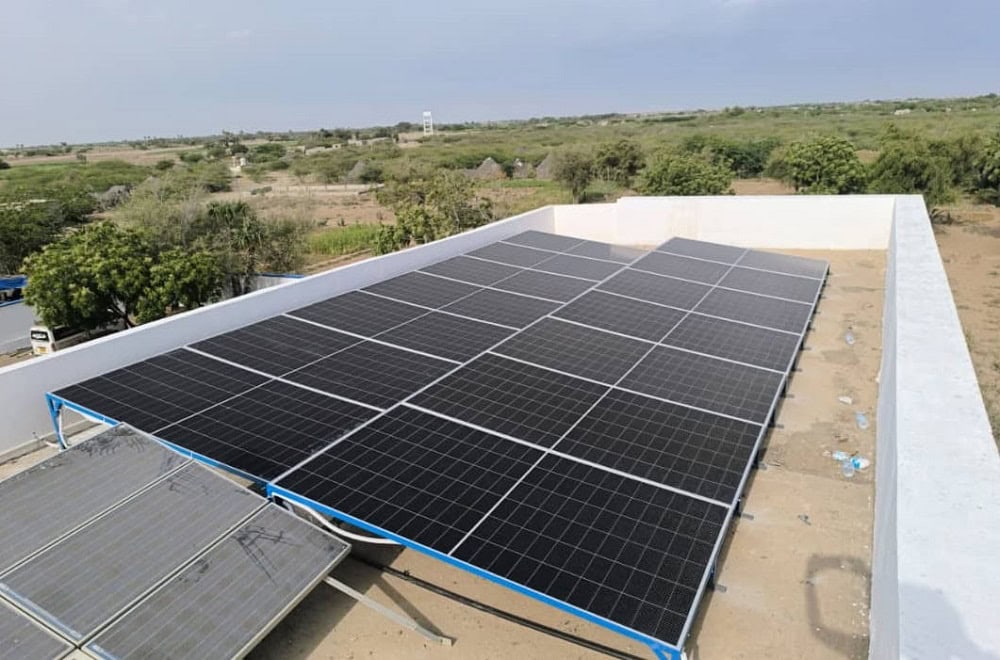
A house in Aden governorate powered by solar energy (pic ‘South24 Center’ courtesy ‘Al Akhawain’ green energy company)
Last updated on: 20-05-2025 at 5 PM Aden Time

|
|
Khadija Al-Jasri (South 24)
In a country torn by war for over a decade, the talk about "green transformation" is no longer just an intellectual exercise or an environmental choice -- it has become a matter of economic and social survival. Among the rubble and darkness, the solar energy sector in Yemen has emerged as one of the most dynamic fields in the local economy, transcending its technical function to symbolize a viable solution for the future.
Since 2015, following the intensification of the armed conflict and the collapse of the government electricity grid, cities and villages in Yemen have suffered from frequent power outages, sometimes lasting for days. Due to the damage to power plants coupled with the state's reduced capacity to provide fuel for their operation, the residents sought practical and sustainable alternatives. In this context, solar energy has gradually established itself as a vital lifeline, not only for individuals but for entire institutions, including factories, hospitals, schools, and farms.
While large segments of residents initially turned to basic solutions such as relying on Tubular Lead-Acid Batteries (traditional acid batteries with tubular cells designed for deep charging and discharging) and low-efficiency solar panels, the market has evolved significantly in less than a decade with the introduction of advanced technologies such as Gel Batteries (sealed acid batteries with gel material to reduce internal evaporation and enhance safety), and later Lithium Batteries, which have high energy storage density and longer lifespan.
Experts agree that the electricity crisis has opened up an exceptional window for growth. Due to the high prices of conventional fuels and the difficulty in obtaining them, along with the frequent damage to electric generators and the costs of their maintenance, solar energy has emerged as not just an option but the only feasible and cost-effective solution for many residents and vital installations. This sudden and unplanned transformation is a direct result of popular demand and societal pressure, more than a national energy strategy or government policy.
The local market appears to have responded quickly to this transformation too, with the spread of solar panel installation workshops, battery sales centers, and firms specializing in designing residential and commercial solar systems. Simultaneously, there has been an increased demand for vocational training in this field, creating new job opportunities, in a market plagued by chronic unemployment.
This rapidly accelerating scene raises essential questions about the future of clean energy in Yemen: Will solar energy become the backbone of the alternative electricity system? Will Yemen be able to build a regulated and stable renewable energy market amid the fragility of the state? What are the risks associated with the lack of oversight and the entry of counterfeit or low-quality products into this flourishing market?
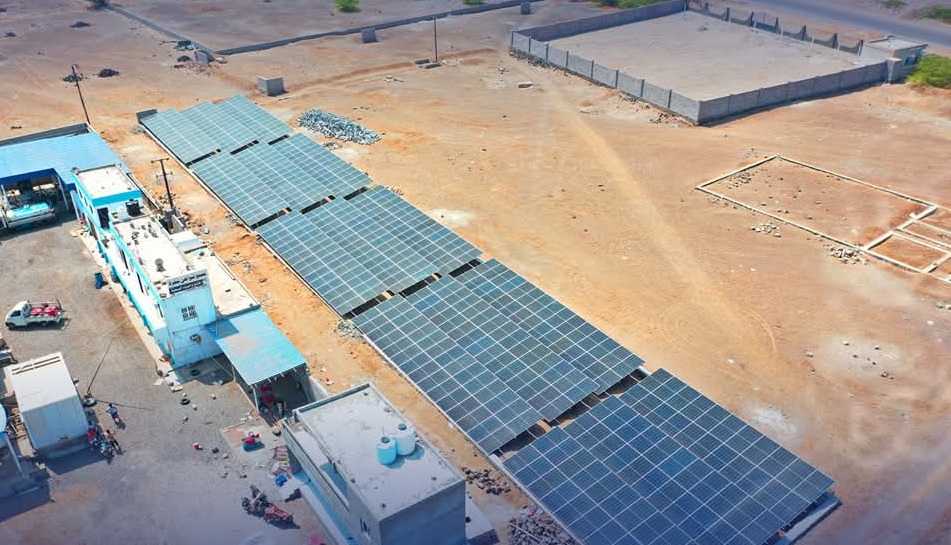
A mineral water factory in Abyan relying on solar energy (picture for ’South24 Center courtesy ’Al Akhawain ‘green energy company).
In this report, ‘South24 Center‘ highlights the dynamics of the clean energy market in Yemen through testimonies from local experts, companies, and institutions specializing in this type of energy, as well as officials from the Yemeni government.
From Crisis to Commercial Potential
Amidst the ongoing war and the near-complete political and economic instability, Yemen’s energy landscape has shifted from a centralized state-run model to a decentralized one dictated by necessity. Solar energy has found itself at the forefront of this shift, not only as an alternative to fossil fuel but as a foundation for an unprecedented commercial and investment growth in the war-torn country.
This transformation was clearly seen in July 2024 when the first and largest solar power plant in Yemen was inaugurated in Aden, with a generation capacity of 120 MW. The project, created in collaboration with the Emirati state-owned renewable energy company ’Masdar‘, represents a turning point, not just in terms of its size but also in its symbolism as a strategic project reflecting a shift in the country’s energy infrastructure. On May 5, 2025, the second phase of the project was launched, to add another 120 MW to the plant, with UAE funding.
Engineer Majed Abdullah Al-Namla, Director of ’Al Akhawain‘ company for solar energy, describes the current Yemeni market as "dynamic and accelerating”. He explained to ’South24 Center‘ about the growing demand for solar systems, especially in the industrial and commercial sectors, which has encouraged local and international companies to offer advanced solutions that go beyond simple home use.
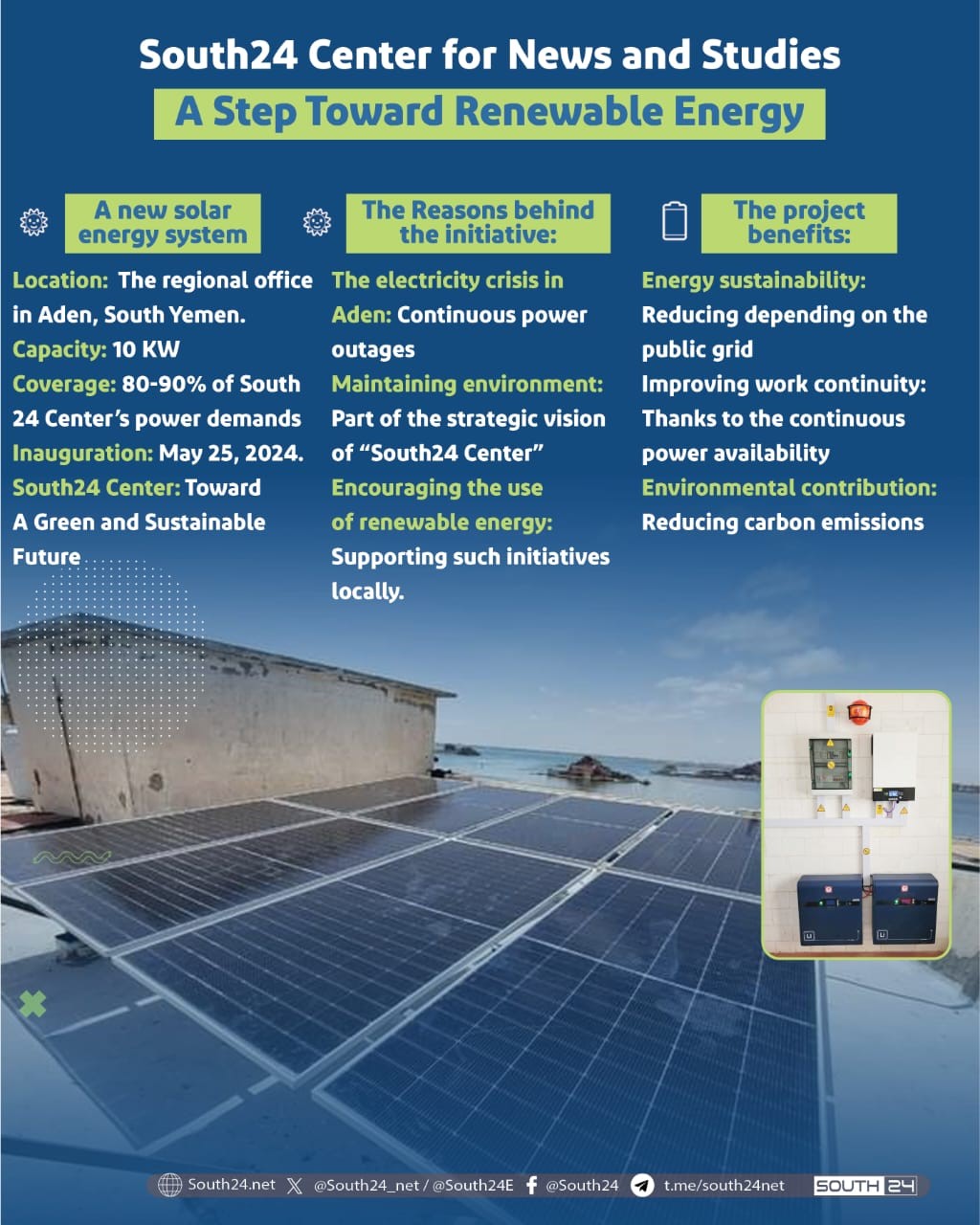
Al-Namla also highlighted that a pioneering Chinese company MMD recently launched a new system combining a 256 kWh Battery Cabinet and a 125-kW inverter which converts direct current from solar panels into alternating current for use in homes and facilities. The system was designed in a flexible way to allow the integration of multiple units to reach a total capacity of 1000 kW. This meets the needs of large projects such as hospitals, hotels, and medium-sized factories.
He added that "Over the past two years, Aden has witnessed a real shift in the awareness of traders and owners of major facilities. Solar energy is now viewed not as a temporary option but as a strategic guarantee for the continuity of economic activity." He mentioned that his company recently received dozens of requests for feasibility studies from health and commercial institutions that are still relying on diesel-powered generators and suffering financial losses due to the fuel price fluctuations.
According to Al-Namla, "The cost of operating generators has become a real burden”, and pointed out that some hospitals are spending up to 30% of their monthly budgets on fuel. He said that switching to solar energy could reduce this by more than half in just two years.
For his part, Tawfiq Atef, Director of ’Bin Atef Center for Renewing Energy‘ told ’South24 Center’ that the solar energy market in Aden has seen rapid growth since the beginning of the war, driven by what he calls a "permanent electricity emergency”. He explained that the initial phase of this transformation was characterized by limited use of simple technologies such as low-efficiency Indian devices and Tubular Lead-Acid Batteries which cannot withstand long charge and deep discharge cycles and often fail within a few months.
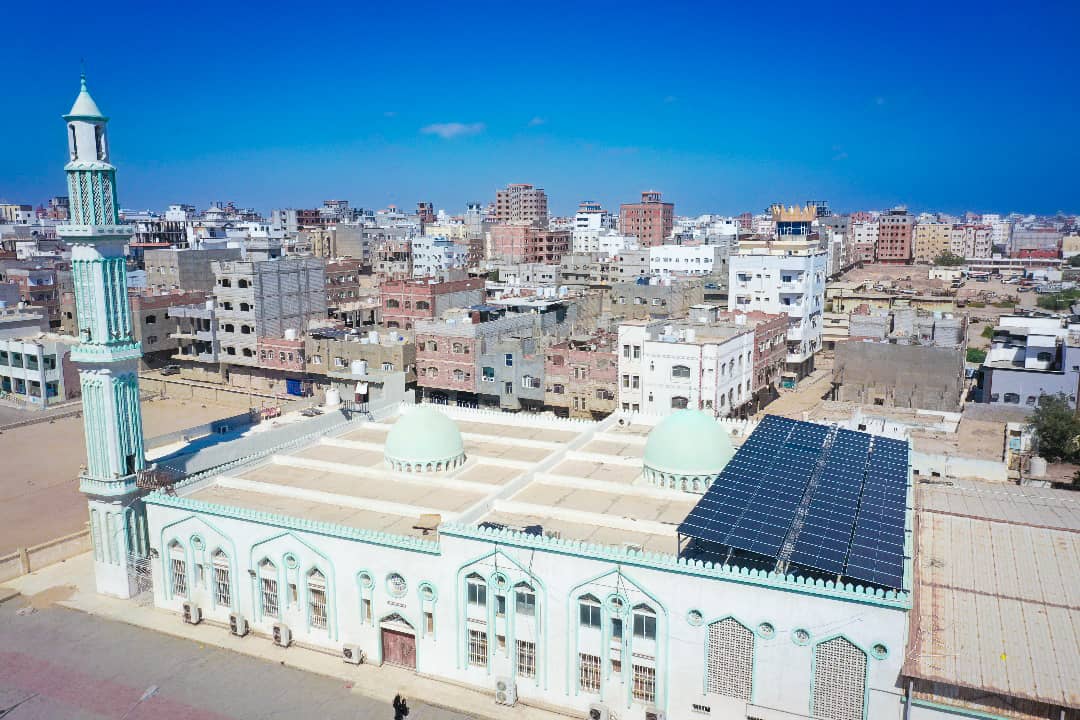
A mosque in Aden governorate relying on solar energy (pic’South24 Center‘ courtesy ’Al Akhawain‘ green energy company).
However, the market began to change with the introduction of "gel" batteries, which are more efficient and technically safer as they are sealed and do not emit toxic fumes. Later, with the global decline in solar panel prices in the early 2020s, dozens of companies entered the Yemeni market — some as officially licensed agents of international companies, and others operating informally.
The biggest jump in the sector occurred in 2024 with the entry of lithium batteries into the local market. Lithium batteries (Lithium Iron Phosphate - LiFePO4) represent the latest generation of batteries used in solar energy systems. They are characterized by high storage density, longer lifespan, and charging efficiency that surpasses lead-acid batteries by 30% to 40%.
Atef pointed out that "demand for these batteries has surged significantly in recent months, especially from educational institutions and shops that are looking for reliable systems to reduce disruptions in their work caused by power outages”. He also noted that many customers now request for batteries with storage capacities starting from 200 ampere/hours or more, reflecting the rising expectations regarding performance and sustainability.
A Realistic Alternative Solution
Abdulrahman Al-Sharji, a resident of Aden, sharing his personal experience with solar energy, told ‘South24 Center’: "I used to rely on government electricity, despite the repeated power outages, and kept a small generator in case of necessity. However, the cost of the fuel and maintenance made it unsustainable. So, I decided to switch to solar energy."
Al-Sharji said while the decision was not easy financially, but it paid off in the long run. He said: "I have made significant savings on my electricity and fuel bills. My life has become more stable. Electricity is available throughout the day and the household appliances work smoothly. I don’t have to worry constantly about power outages or sudden damage." Al-Sharji added proudly, "I now feel that I am part of the solution, not just a recipient of the crisis."
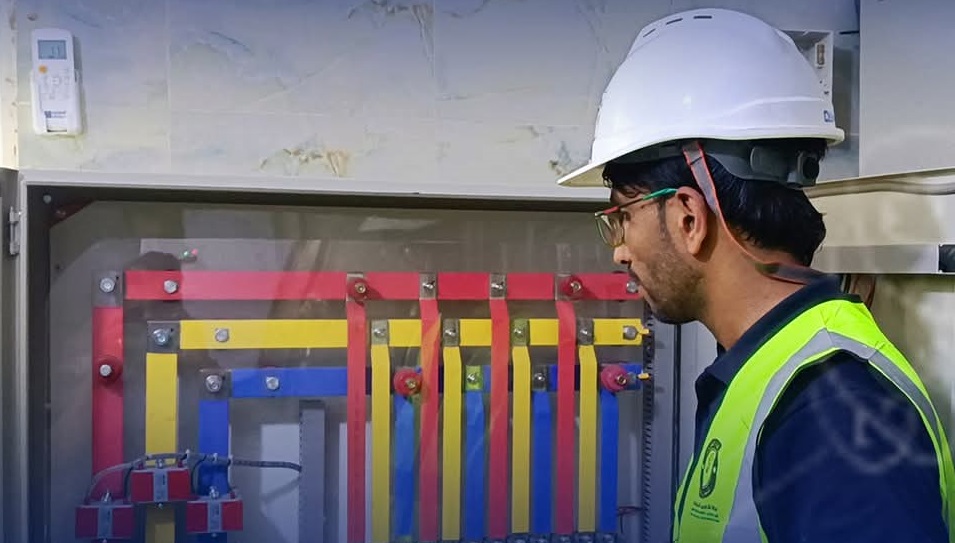
A solar energy engineer (’South24 Center‘ pic courtesy ’Al Akhawain‘ green energy company).
At the institution level, Engineer Ahmed Zaki, Director of Solar Energy at the Yemeni Ministry of Electricity, points out that governorates like Lahj and Hadramout have witnessed a significant transformation due to the integration of solar energy into essential service systems. He told ‘South24 Center’: "In Lahj alone, more than 6,000 people have benefited from solar-powered irrigation systems, while 700 families in Hadramout have benefited from similar projects provided by international organizations in collaboration with local authorities."
Zaki confirms that these systems have not only reduced costs but also empowered women to participate in agricultural work. Dozens of women have been trained in solar system maintenance and performance monitoring, providing them with an independent income source and technical skills needed in the market.
Engineer Bassam Al-Sanami, an expert in clean energy, said that the sector has witnessed a "quantitative and qualitative leap" in solar system installations over the past four years. He told ‘South24 Center’: “Traders are now competing to offer the best types of photovoltaic panels — the cells that convert sunlight into electricity. With the intensifying competition, some have started importing panels from globally reputed companies, which has improved the quality of equipment in the market.”
However, Al-Sanami noted that most inverters — the devices that convert the direct current produced by solar panels into alternating current suitable for use — are still of low quality, except for those provided by some international organizations or large institutions that follow strict technical standards. He also highlighted that lack of qualified personnel to maintain these advanced devices leads to frequent breakdowns.
Regarding investment prospects, Al-Sanami believes it is very promising, especially in rural Yemen. He elaborated: “Some traders have started offering solar energy systems to farmers through a deferred ownership system, where the farmer pays for the system using the funds he would have previously spent on purchasing diesel fuel. This model is revolutionizing the traditional concept of investment, as it combines profitability with social impact.”
He added that this type of project, if organized through clear legal contracts, can attract the attention of foreign investors who are seeking both profit and developmental impact.
Multiple Challenges
The main challenges to the growth of Yemen’s clean energy market include the dire economic situation, weak purchasing power of citizens, and the decline of the local currency.
Al-Namla named other challenges such as commercial fraud. He said, "We are facing a worrying proliferation of low-quality lithium batteries in the Yemeni market. Many sellers promote third or fifth-grade cells as top quality, which reflects negatively on performance and drastically shortens the battery’s lifespan."
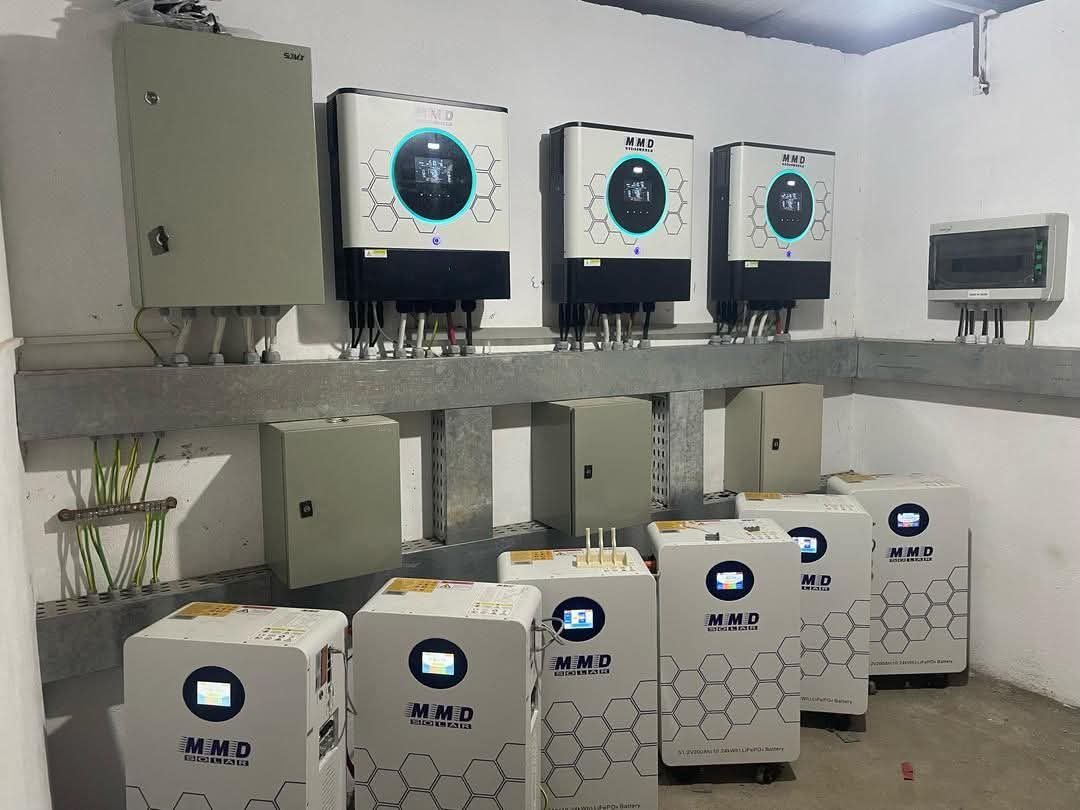
A type of lithium battery in the Yemeni market (‘South24 Center’, pic courtesy ’Al Akhawain‘ green energy company).
Lithium batteries, which entered the Yemeni market in 2024, offer significant technical advantages compared to traditional lead-acid batteries. However, they require precise conditions for storage, installation, and maintenance. In the absence of specialized technical staff, Al-Namla says some batteries are installed haphazardly without real technical testing, which has led to catastrophic failures, including fires in some cases.
He added that many shops claim that the batteries they are selling contain cells from ’EVE‘, a globally recognized company known for manufacturing high-quality lithium cells, when in reality these are counterfeit products and have nothing to do with the original brand. The difference between the original and the fake one is not only apparent in the external appearance but is also evident in performance.
Al-Namla explained that the price of high-quality original cells is $150 per kilo, while counterfeit batteries are sold at prices ranging between $100 to $120, which makes them attractive to consumers with limited income, but at the expense of safety and performance.
These concerns are echoed by Engineer Fadl Suwailh, Director of the Consumer Protection Department at the Ministry of Industry and Trade in Aden. In an exclusive statement to ‘South24 Center’, Suwailh confirmed that domestic trade falls under the authority of his ministry, based on the Domestic Trade Law No. 5 of 2007. He said that the ministry closely monitors the clean energy market.
He explained: "We are currently facing a real challenge with the spread of counterfeit goods in the market. The country’s vast area and long coastlines make smuggling easier. This is along with what we call 'systematic smuggling', where shipments of various goods arrive with the counterfeit products hidden inside.”
He continued: "We seized a number of containers containing counterfeit batteries and spare parts, and those behind these operations were referred to the Public Prosecution. A permanent government committee has been formed to destroy the fake goods. It includes representatives from the ministries of Planning, Standards, Agriculture, and local authorities."
Despite these efforts, Suwailh acknowledges that the government’s role remains limited compared to the size and rapid growth of the market. He urged for clearer and more effective steps to support the clean energy sector, including by reducing customs duties, simplifying import procedures, and encouraging traders to invest in solar energy through technical and financial guarantees, especially since this sector has become a suitable option for citizens in light of the rising prices and the lack of alternatives.